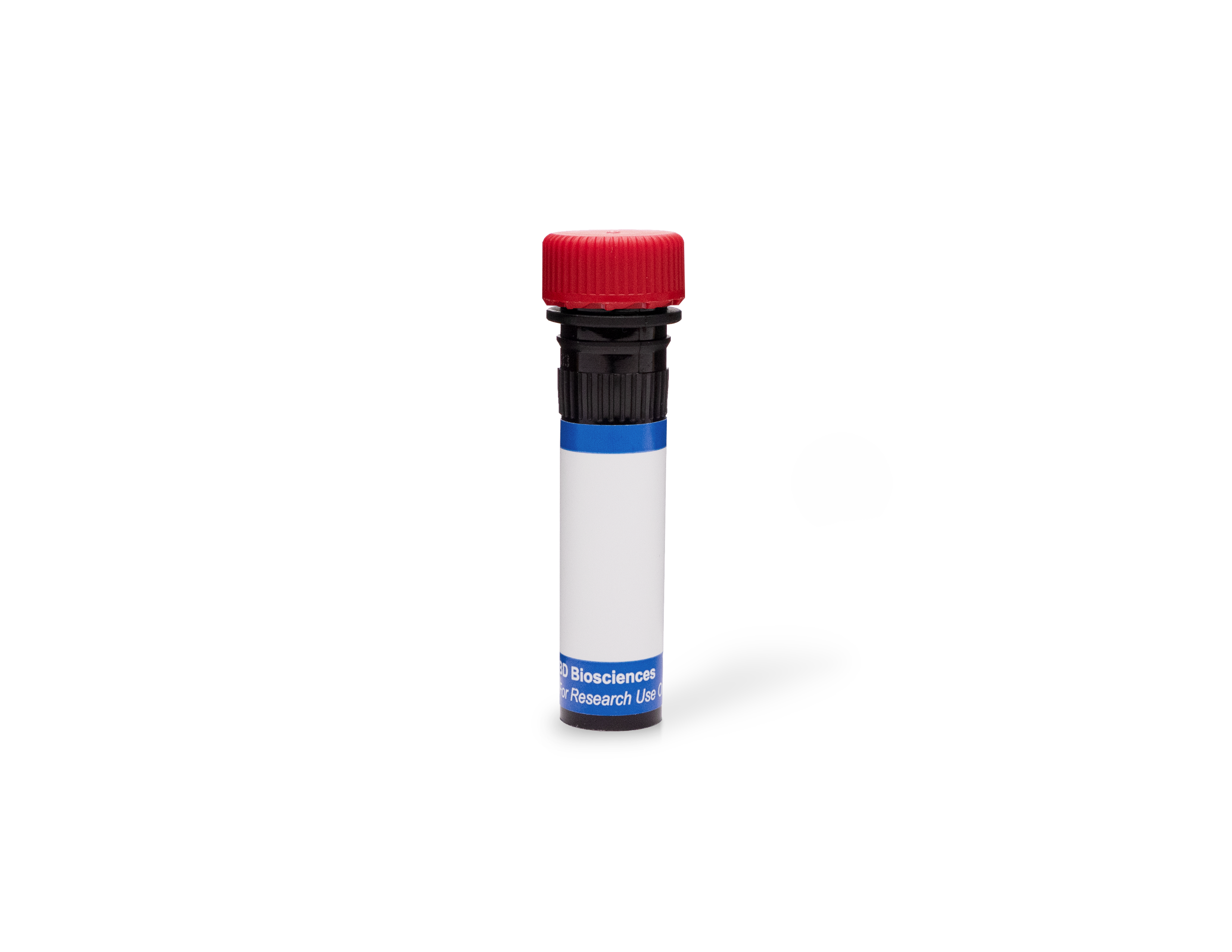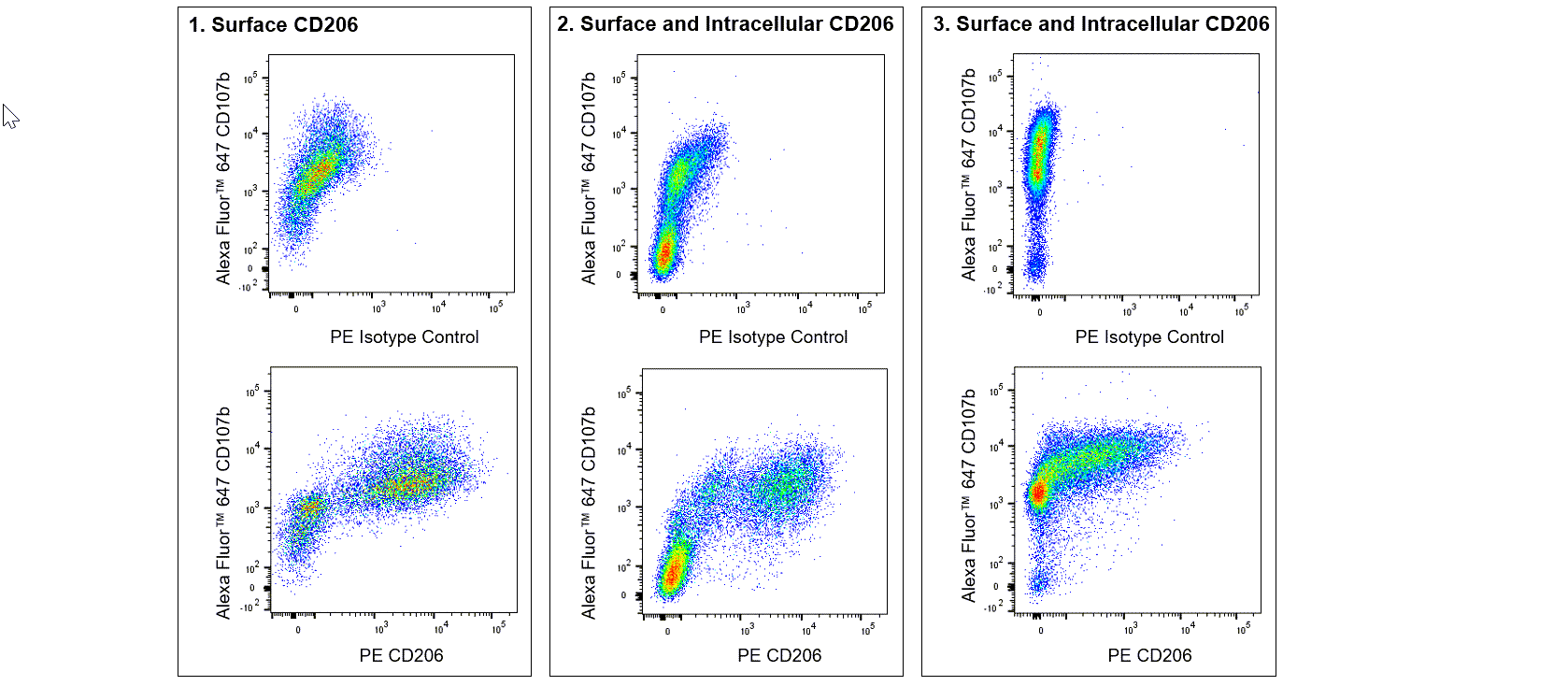


1/2

品牌: BD Pharmingen
 下载产品说明书
下载产品说明书 用小程序,查商品更便捷
用小程序,查商品更便捷



 收藏
收藏
 对比
对比 咨询
咨询反应种属:
Mouse (QC Testing)
Mouse (QC Testing)
来源宿主:
Rat WI, also known as Wistar (outbred) IgG2a, κ
Rat WI, also known as Wistar (outbred) IgG2a, κ
产品介绍
产品信息
耦联标记
PE

抗原名称
CD206

宿主
Rat WI, also known as Wistar (outbred) IgG2a, κ

免疫原
Mouse CD206 Recombinant Protein

简单描述
The Y17-505 monoclonal antibody specifically binds to CD206 which is also known as the Macrophage mannose receptor (MMR, MR) or Mannose receptor, C type 1 (Mrc1). CD206 is a type I transmembrane glycoprotein of approximately 175 kDa that belongs to the C-type lectin superfamily. It is expressed at the cell surface and intracellularly by macrophages, Langerhans cells, dendritic cells, and endothelial cells within hepatic and lymphoid tissues. This pattern recognition receptor binds to endogenous and microbial glycoconjugates containing mannose, fucose, or N-acetylglucosamine through its C-type lectin-like carbohydrate recognition domains (CRD). CD206 also contains a cysteine-rich domain that enables binding to sulfated carbohydrate antigens. This receptor enables macrophages and other specialized cells to maintain tissue homeostasis as well as to internalize microbes or their components by phagocytosis or endocytosis. CD206 thus plays important roles in mediating innate immunity, eg, enabling phagocytosis, as well as in processing and presenting antigens for the generation and expression of adaptive immunity. Moreover, CD206 has been associated with leucocyte homing and cancer cell metastasis.

商品描述
The Y17-505 monoclonal antibody specifically binds to CD206 which is also known as the Macrophage mannose receptor (MMR, MR) or Mannose receptor, C type 1 (Mrc1). CD206 is a type I transmembrane glycoprotein of approximately 175 kDa that belongs to the C-type lectin superfamily. It is expressed at the cell surface and intracellularly by macrophages, Langerhans cells, dendritic cells, and endothelial cells within hepatic and lymphoid tissues. This pattern recognition receptor binds to endogenous and microbial glycoconjugates containing mannose, fucose, or N-acetylglucosamine through its C-type lectin-like carbohydrate recognition domains (CRD). CD206 also contains a cysteine-rich domain that enables binding to sulfated carbohydrate antigens. This receptor enables macrophages and other specialized cells to maintain tissue homeostasis as well as to internalize microbes or their components by phagocytosis or endocytosis. CD206 thus plays important roles in mediating innate immunity, eg, enabling phagocytosis, as well as in processing and presenting antigens for the generation and expression of adaptive immunity. Moreover, CD206 has been associated with leucocyte homing and cancer cell metastasis.

产品详情
PE
R-Phycoerythrin (PE), is part of the BD family of Phycobiliprotein dyes. This fluorochrome is a multimeric fluorescent phycobiliprotein with excitation maximum (Ex Max) of 496 nm and 566 nm and an emission maximum (Em Max) at 576 nm. PE is designed to be excited by the Blue (488 nm), Green (532 nm) and Yellow-Green (561 nm) lasers and detected using an optical filter centered near 575 nm (e.g., a 575/26-nm bandpass filter). As PE is excited by multiple lasers, this can result in cross-laser excitation and fluorescence spillover on instruments with various combinations of Blue, Green, and Yellow-Green lasers. Please ensure that your instrument’s configurations (lasers and optical filters) are appropriate for this dye.

PE
Yellow-Green 488 nm, 532 nm, 561 nm
496 nm, 566 nm
576 nm
应用
反应种属
Mouse (QC Testing)

背景
别名
CD206; MMR; Mrc1; macrophage mannose receptor 1

制备和贮存
存储溶液
Aqueous buffered solution containing ≤0.09% sodium azide.

保存方式
Aqueous buffered solution containing ≤0.09% sodium azide.
文献
文献
研发参考(6)
1. Akbarshahi H, Menzel M, Posaric Bauden M, Rosendahl A, Andersson R. Enrichment of murine CD68+ CCR2+ and CD68+ CD206+ lung macrophages in acute pancreatitis-associated acute lung injury. PLoS ONE. 2012; 7(10):e42654. (Biology).
2. Burgdorf S, Lukacs-Kornek V, Kurts C. The mannose receptor mediates uptake of soluble but not of cell-associated antigen for cross-presentation. J Immunol. 2006; 176(11):6770-6776. (Biology).
3. Marttila-Ichihara F, Turja R, Miiluniemi M, et al. Macrophage mannose receptor on lymphatics controls cell trafficking. Blood. 2008; 112(1):64-72. (Biology).
4. McKenzie EJ, Taylor PR, Stillion RJ, et al. J Immunol. 2007; 178(8):4975-4983. (Biology).
5. Rybalko V, Hsieh PL, Merscham-Banda M, Suggs LJ, Farrar RP. The Development of Macrophage-Mediated Cell Therapy to Improve Skeletal Muscle Function after Injury.. PLoS One. 2015; 10(12):e0145550. (Biology).
6. Zamze S, Martinez-Pomares L, Jones H, et al. Recognition of bacterial capsular polysaccharides and lipopolysaccharides by the macrophage mannose receptor. J Biol Chem. 2002; 277(44):41613-41623. (Biology).

声明 :本官网所有报价均为常温或者蓝冰运输价格,如有产品需要干冰运输,需另外加收干冰运输费。






 危险品化学品经营许可证(不带存储) 许可证编号:沪(杨)应急管危经许[2022]202944(QY)
危险品化学品经营许可证(不带存储) 许可证编号:沪(杨)应急管危经许[2022]202944(QY)  营业执照(三证合一)
营业执照(三证合一)